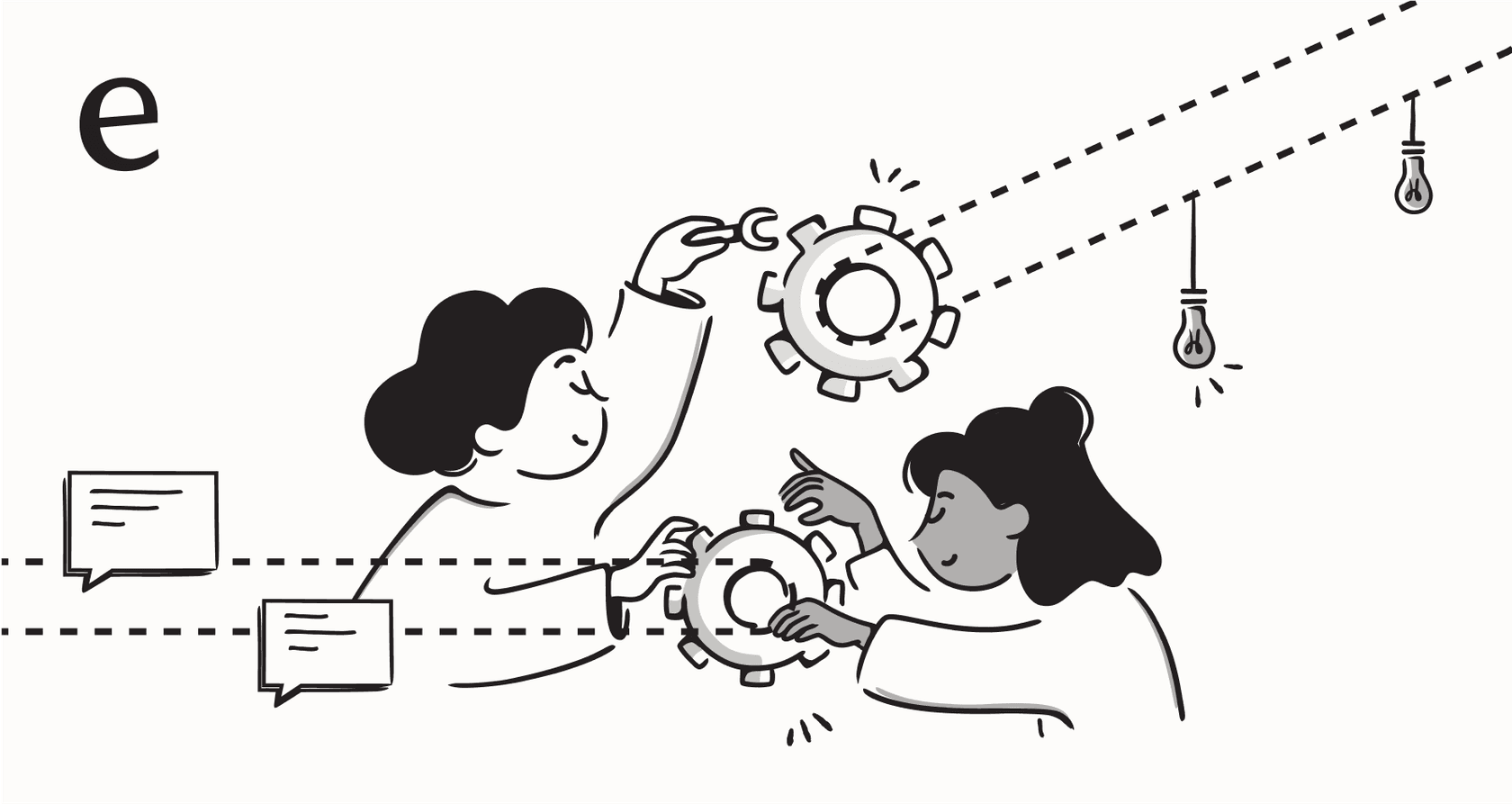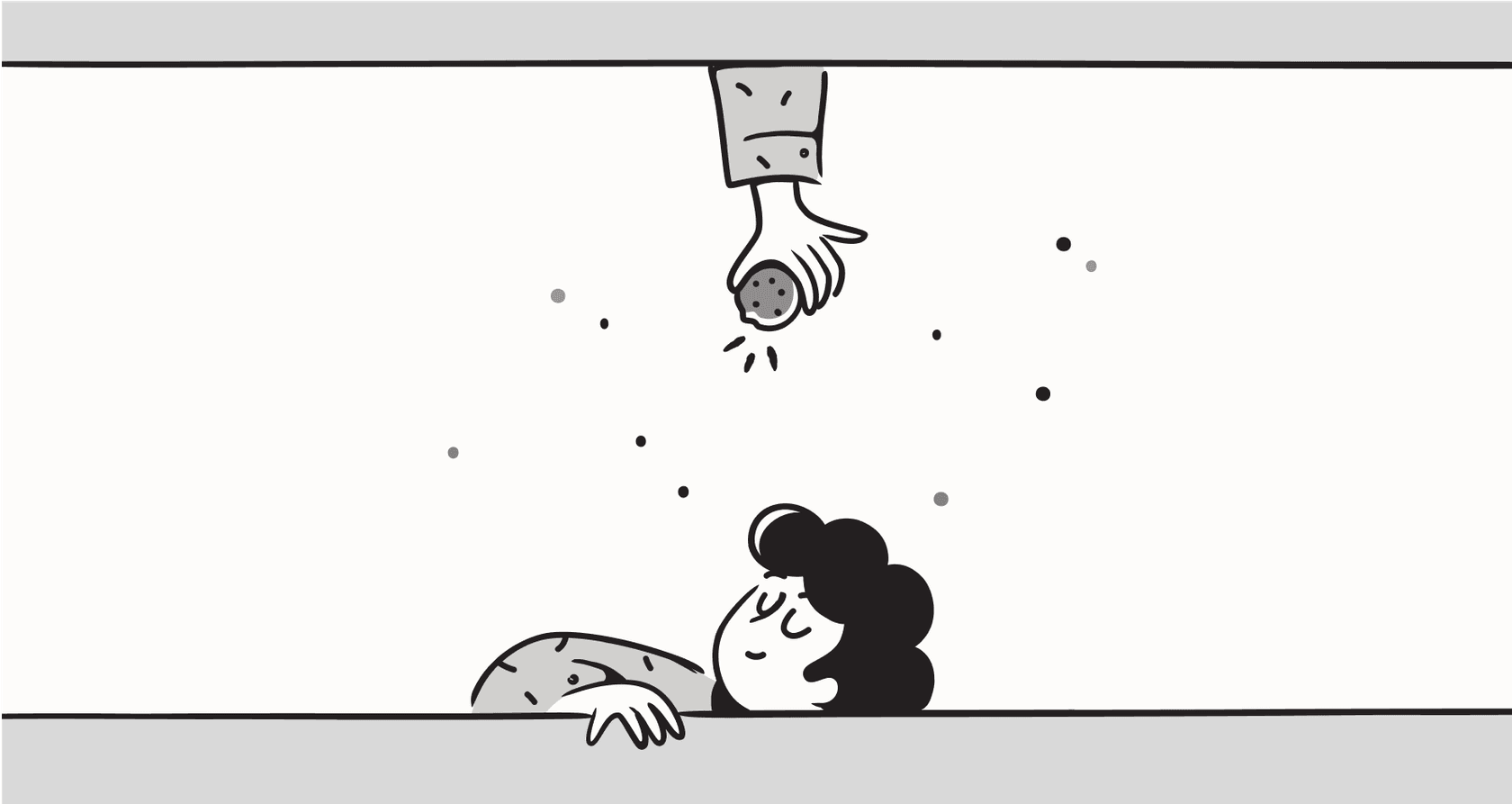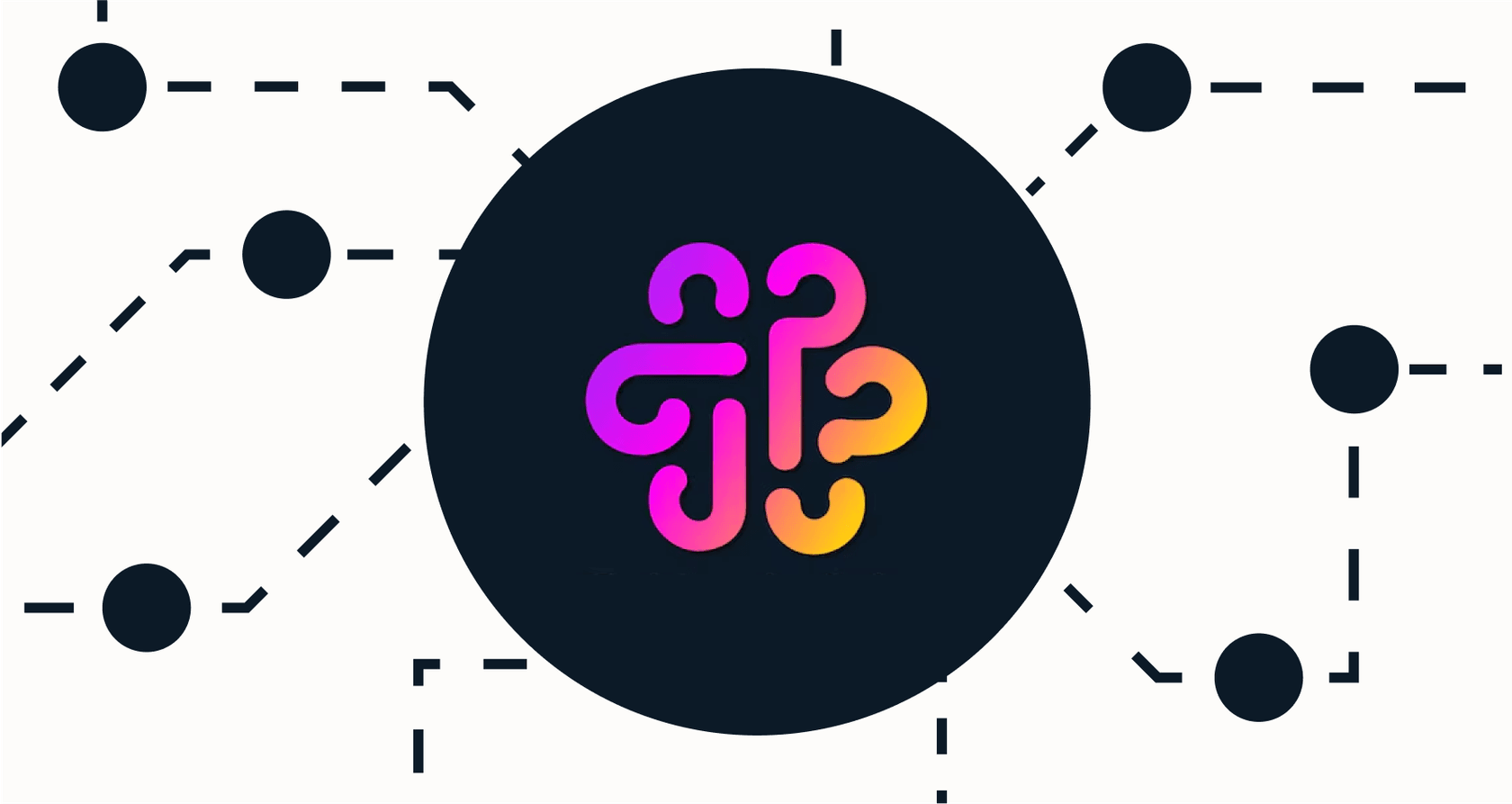
We were all promised that AI would make our lives simpler. But if we're being honest, the explosion of AI tools has just created a new kind of headache: "AI sprawl." Teams are now juggling a dozen different subscriptions for writing, research, and automation. It's a mess of constant copy-pasting, lost context, and bills that just keep piling up.
ClickUp's answer to this chaos is ClickUp Brain, an AI assistant built directly into its project management platform. The pitch is pretty compelling: one AI to handle everything, connecting your tasks, documents, people, and company knowledge so you can finally stop switching between tabs.
But does it actually deliver? This guide offers a real-world look at ClickUp Brain, digging into its core features, pricing, and where it falls short. We'll help you figure out if it’s the right all-in-one AI for your team or if a more specialized tool would serve you better.
What is ClickUp Brain?
ClickUp Brain isn’t just another feature tacked onto the platform. It's meant to be an "intelligence layer" that works across everything you do in ClickUp. Think of it as a brain that understands how your tasks, documents, chats, and projects are all connected, giving you help that’s actually relevant.
Under the hood, it uses a mix of large language models (LLMs) like OpenAI's GPT-4o and Anthropic's Claude. One of its neatest tricks is that you can switch between these models depending on what you're doing. Need to brainstorm complex ideas? Fire up GPT-4o. Need to summarize a long document? Claude might be the better choice. This multi-model approach is a nice touch, so you’re not locked into a single AI provider.
You can chat with it through a central "Brain Assistant," use slash commands inside documents, or tap into specific AI tools designed for different roles, from marketing to engineering. The whole point is to stop the endless copy-pasting between your work and your AI, keeping everything in one place. It’s an ambitious goal, but one that could save teams a lot of time if it works as promised.
Breaking down ClickUp Brain's core features
ClickUp Brain is a huge suite of tools trying to tackle project management, knowledge sharing, and content creation all at once. To really know if it's right for you, we need to look at its main components.
Project manager: Automating your workflows
ClickUp Brain really tries to automate the "work about work" that bogs so many teams down. Its project management features are woven directly into ClickUp’s tasks, lists, and boards.
Here are a few key features:
- Autopilot: You can set up rules to automatically assign tasks, update priorities, and post progress summaries based on certain triggers. This is a big help for repetitive project admin.
- Intelligent Task Assignment: The AI looks at your team's workload, skills, and past projects to suggest the best person for a new task.
- AI Stand-ups: It automatically pulls together daily updates and flagged issues into a tidy summary, which means fewer status meetings.
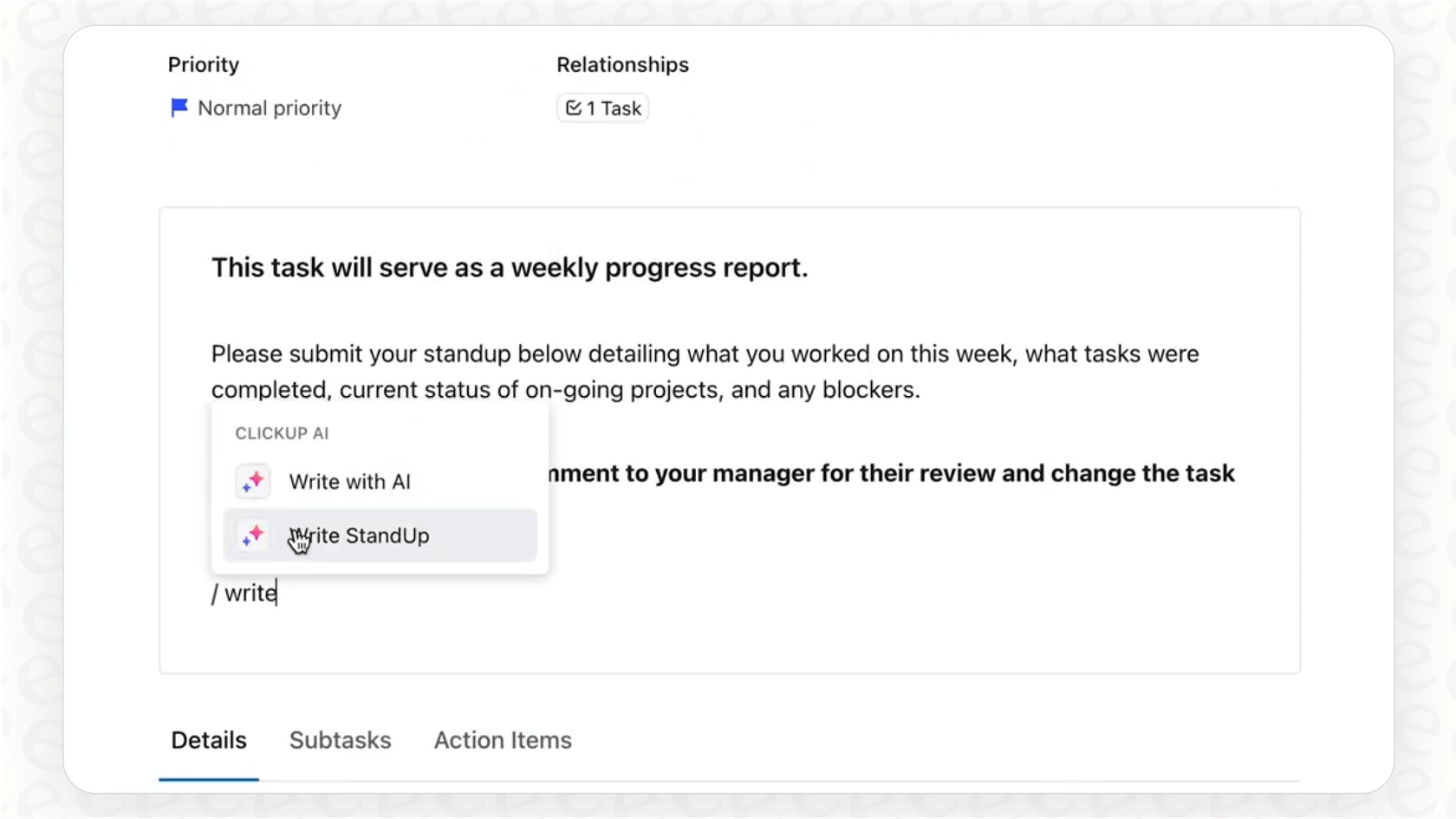
These features are genuinely useful for managing internal projects. But things get tricky when you move into more specialized workflows like customer support or IT service management (ITSM). An AI for a help desk needs to do more than just update a task; it needs to understand customer sentiment, pull order data from Shopify, and decide whether to send a reply or escalate to a person. This is where a purpose-built platform like eesel AI has a clear advantage. It offers deep integrations with help desks like Zendesk and Freshdesk to perform actions that are actually useful for support agents.
Knowledge management: A single source of truth?
ClickUp Brain attempts to become your company's all-knowing brain with its Enterprise AI Search & Ask feature. It can search through your ClickUp tasks, docs, and chats, and even connect to apps like Google Drive and Slack to find answers.
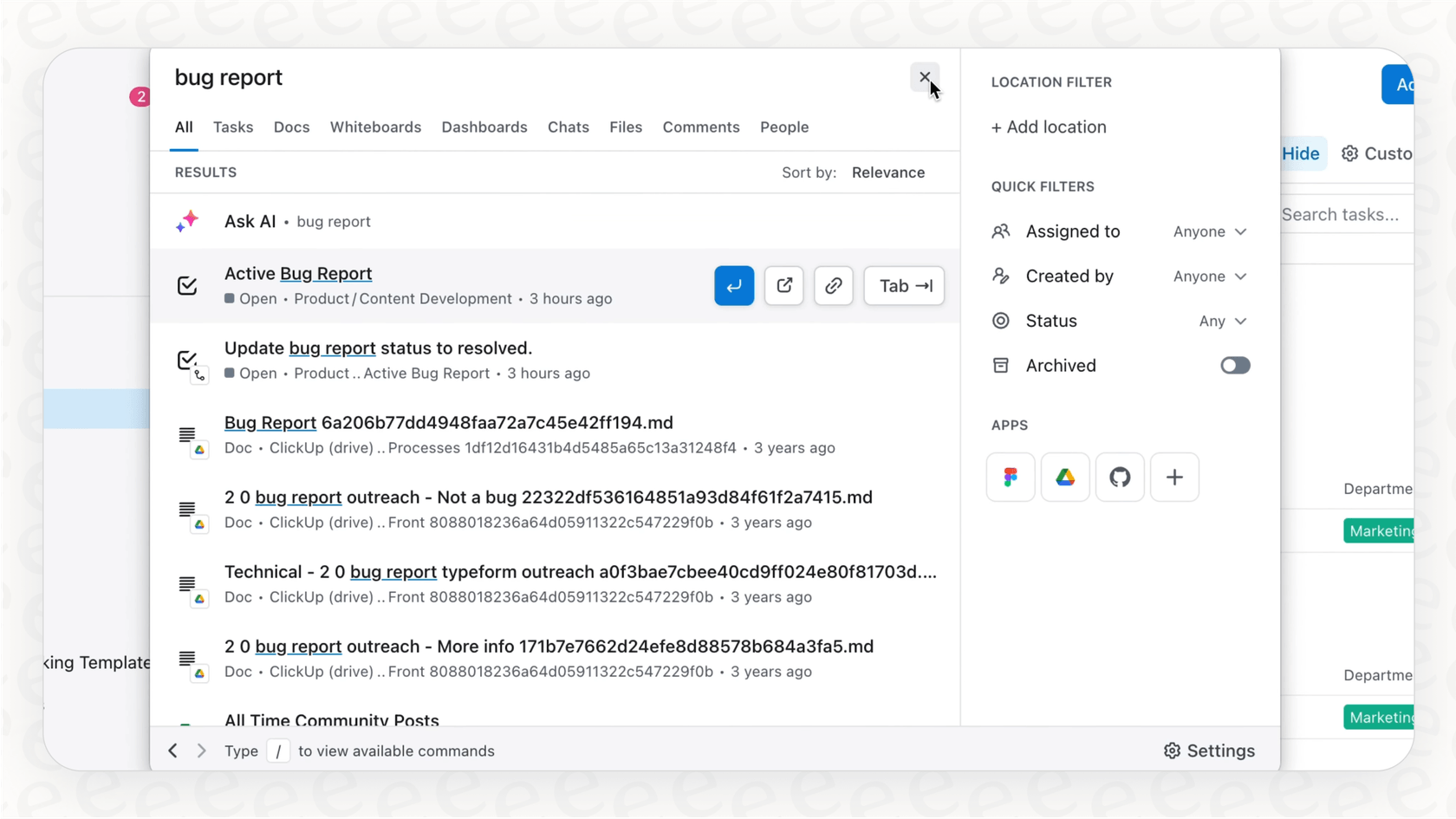
The catch? Its knowledge is heavily focused on project-related files. It’s great at finding that marketing brief from last quarter, but what about solving a customer's niche technical problem? For customer support or internal IT help, the real answers are usually buried in past support tickets, help center articles, and internal wikis. An AI that's only trained on project docs is flying blind when it comes to resolving a specific customer issue.
This is a huge difference compared to a tool like eesel AI, which connects directly to and learns from your actual support and knowledge platforms like Zendesk, Intercom, and Confluence. It provides accurate, reliable answers right away because it’s trained on the content that actually helps resolve support tickets.
Content creator: From docs to images
The platform also includes a pretty flexible set of content generation tools. The AI Doc Writer can help you draft project briefs and meeting agendas, while the AI Image Generator can create visuals from a simple text prompt. It can even whip up social media posts, email copy, and code snippets.
This makes it a solid all-around assistant for internal communications and marketing content. But for high-stakes, customer-facing conversations, a generic writer often falls short. You need an AI that has learned your team’s specific tone, style, and what a good resolution actually sounds like.
For example, eesel AI's Copilot is trained exclusively on your team's past support conversations. This allows it to draft replies that sound just like your best agents, which makes a huge difference in improving consistency and first-response time.
ClickUp Brain pricing and real-world limitations
The feature list for ClickUp Brain is definitely long, but before you dive in, it’s important to look at the practical side of things: cost and performance.
Understanding the pricing model
First off, ClickUp Brain isn't included in the standard ClickUp plans; it’s a paid add-on. And from what we've seen from users, it can be a pretty hefty investment. Some have mentioned that the AI add-on can cost more per user than the core platform license itself, which can get expensive fast.
The pricing is tiered, and more advanced features like unlimited automations and custom agents are locked behind the highest "AI Autopilot" plan. This can make the total cost pretty steep, especially for larger teams who need those extra features.
Opinions on ClickUp AI / Brain from those actually using it please???User feedback on the pricing structure of the ClickUp Brain add-on. This is a big contrast to the straightforward pricing you see with platforms like [eesel AI](https://www.eesel.ai/pricing). With eesel AI, you get access to all the core products under plans based on your interaction volume, not the number of seats. There are no surprise per-resolution fees, so your costs won't suddenly jump after a busy month. Plus, you have the flexibility of monthly plans you can cancel anytime, which is a nice change from being locked into a long-term contract.
byu/Top-Accident-8186 inclickup
| Feature | ClickUp Brain | eesel AI |
|---|---|---|
| Pricing Model | Per user, per month (add-on) | Based on interaction volume |
| Billing Metric | Tiers unlock features | Tiers scale capacity |
| Hidden Fees | Can get pricey per seat | No per-resolution fees |
| Flexibility | Standard plan structures | Flexible monthly plans available |
Common challenges and user feedback
An "all-in-one" platform sounds great on paper, but it often comes with a trade-off. Some ClickUp users have pointed out performance lag, a clunky interface, and occasional bugs with the AI features. When a platform tries to do everything, it can sometimes feel like it doesn't do any one thing perfectly. A tool that’s a jack-of-all-trades might not be the master of the one you need most.
This is where a focused solution has an edge. eesel AI is built for reliability and simplicity. You can genuinely go live in minutes with its self-serve setup, which is a world away from the weeks or months of implementation some platforms require. Its powerful simulation mode lets you test the AI on thousands of your historical tickets before you ever turn it on for customers. This helps you avoid the buggy or unhelpful rollouts that can frustrate both your customers and your agents.
When to choose ClickUp Brain (and when to look for an alternative)
Picking the right AI tool really comes down to what your team actually does every day and what tools you're already using.
Who is ClickUp Brain best for?
- Teams deeply embedded in the ClickUp ecosystem: If your organization lives and breathes ClickUp, the seamless integration is a huge plus. There's no denying the convenience of having your AI right where you work.
- Project managers, marketing teams, and developers: These roles can get a ton of value from AI assistance with tasks, content creation, and workflow automation, all without leaving their main workspace.
- Organizations trying to consolidate tools: If your main goal is to fight "AI sprawl" for all your project-related work, ClickUp Brain offers a unified solution.
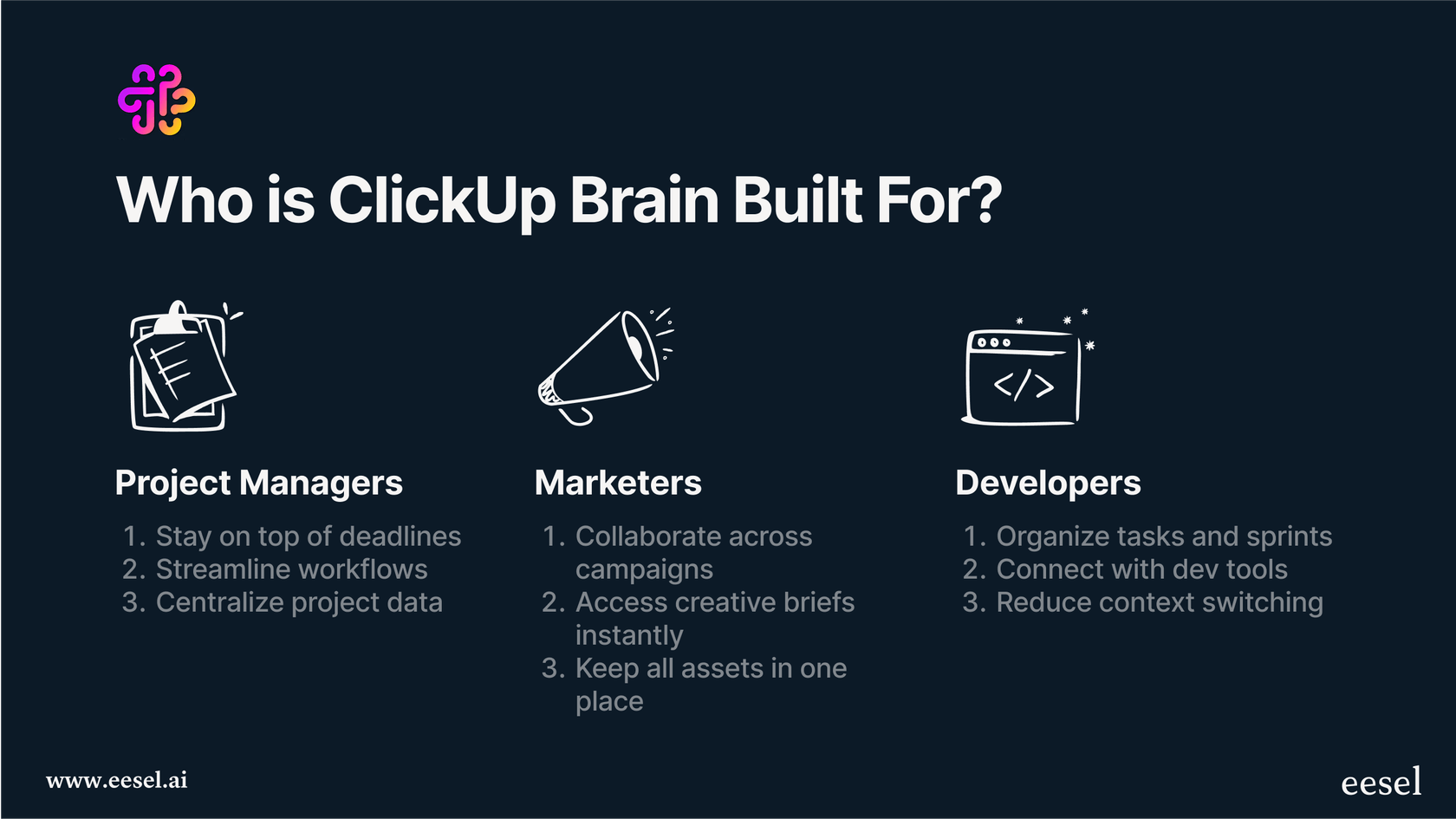
When to consider a specialized AI platform like eesel AI
- If your primary need is customer support automation: You need an AI that connects directly with help desks like Zendesk, Freshdesk, and Intercom. A specialized tool can analyze past tickets, draft replies in your brand voice, and automatically handle tasks like tagging or escalating tickets.
- If you need to automate ITSM and internal support: You need an AI that plugs into tools like Jira Service Management, Slack, and Microsoft Teams to give employees instant answers from internal wikis like Confluence and Google Docs.
- If you demand total control and risk-free testing: You need fine-grained control over your automation rules, the ability to add custom API actions, and a solid simulation mode to prove it works before it goes live. eesel AI's AI Agent and Internal Chat are built from the ground up for these kinds of situations.
Is ClickUp Brain the right AI for you?
ClickUp Brain is, without a doubt, a powerful and ambitious AI platform. For teams that already run their entire workflow in ClickUp, it offers a level of integration that’s hard to beat for managing projects and creating content.
But it's a generalist tool at its core. While it can do a little bit of everything, it doesn't have the specialized depth needed for critical functions like customer support and ITSM automation. Sometimes, a "one-size-fits-all" approach just doesn't fit, especially when you need a tool that excels at a specific, mission-critical job.
Ultimately, the choice comes down to a simple question: do you need an AI that’s a jack-of-all-trades inside your project tool, or do you need a master of one for your support operations?
Give your support team a specialized AI
If your goal is to deliver faster, more accurate, and more consistent support, you need an AI platform that was built for the job. eesel AI plugs directly into your existing help desk and knowledge sources, letting you go live in minutes, not months.
You can train it on your past tickets and help docs to deliver personalized, on-brand support from day one. Simulate its performance with confidence and take back control of your support workflows.
Ready to see what a specialized AI can do? Start your free eesel AI trial today.
Frequently asked questions
ClickUp Brain is a paid add-on, not part of the standard ClickUp subscriptions. The cost is per user and can sometimes be more expensive than the core ClickUp license itself, so you'll need to budget for it as a separate investment.
It primarily learns from the data inside your ClickUp workspace, including tasks, projects, and ClickUp Docs. It is not designed to connect with external help desk platforms like Zendesk, which limits its usefulness for customer support teams.
It's built to be a general-purpose AI assistant for teams that already use ClickUp heavily. Its main strengths are in project management automation, internal content creation, and summarizing information that already exists within your ClickUp account.
You should consider a specialized alternative if your main goal is automating customer support or ITSM workflows. A generalist tool like ClickUp Brain lacks the deep integrations with help desks and knowledge bases that are critical for accurately resolving support tickets.
ClickUp Brain includes several content generation tools that can draft project briefs, meeting agendas, social media posts, and even email copy. It’s a useful feature for speeding up internal communications and marketing tasks directly within your project management tool.
Share this post

Article by
Kenneth Pangan
Writer and marketer for over ten years, Kenneth Pangan splits his time between history, politics, and art with plenty of interruptions from his dogs demanding attention.

